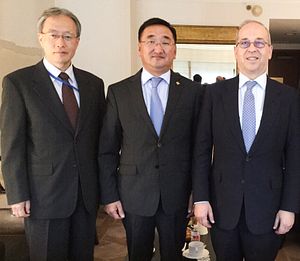As I have written previously, the past few years have witnessed the strengthening of several trilateral mechanisms in the Asia-Pacific, including U.S.-Japan-India and U.S.-Japan-Australia (See: “Why the ‘New’ US Trilateral Dialogue with Japan and India Matters”). One of the more neglected ones in the mix has been the U.S.-Japan-Mongolia trilateral.
The U.S.-Japan-Mongolia trilateral is an outgrowth of Ulaanbaatar’s long held close relationships with both countries, partly of its ‘third neighbor policy’ aimed at cultivating relationships with other important states to reduce its dependence on its two neighbors, China and Russia (though it should not be forgotten that Mongolia also has a separate trilateral with Beijing and Moscow). Japan has been Mongolia’s largest aid donor since the 1990s, and U.S.-Mongolia relations, first established in 1987, have strengthened due to recent developments including Ulaanbataar’s support for U.S.-led efforts in Iraq and Afghanistan.
The rise of the trilateral between the three democracies is also yet another manifestation of the more active role Mongolia is seeking to play in the region and world under President Tsakhiagiin Elbegdorj. His tenure has witnessed the rise of several Mongolia-led initiatives, from the birth of regional institutions like the Ulaanbataar Dialogue on Northeast Asian Security to a willingness to play a role in mediating role between North Korea and the international community.
On the back of these developments, on September 29 the three countries held their first ever trilateral meeting in New York City on the sidelines of the United Nations General Assembly. The meeting was attended by U.S. Assistant Secretary for East Asian and Pacific Affairs Daniel Russel, Director General of Asian and Oceanic Affairs Bureau of the Ministry of Foreign Affairs of Japan Junichi Ihara and Minister for Foreign Affairs of Mongolia Lundeg Purevsuren.
At the meeting, the three sides discussed steps they could take to deepen trilateral cooperation, including expanding economic relations and deepening regional security cooperation. “We were able to have a very, very fruitful and productive exchange on a range of issues,” Russel told journalists at the Foreign Press Center in New York last Friday.
Pressed on exactly what was discussed, Russel was vague, noting only that discussions centered on a variety of regional issues as well as how the United States and Japan – as major investors and economies – can better support reforms and the improved investment climate in Mongolia. He played down the notion that Washington and Tokyo were using Ulaanbataar as a mediator on the North Korea issue, though he did emphasize that Pyongyang ought to see Mongolia’s democracy as a model given its previous status as a communist state.
Yet as is the case with other trilaterals as well, the lack of publicly released specifics in early meetings should not detract from their value in creating an institutionalized, regular setting for partners to exchange views, coordinate actions and increase comfort in the way they deal with each other. This can help lay the foundation for greater cooperation further down the line.
“The first Mongolia-U.S.-Japan Trilateral Meeting laid the foundation for an important dialogue mechanism with our Third neighbors – the U.S and Japan – to exchange views on a broad range of regional and global security and economic issues, and on how to coordinate actions at the regional and global levels that reflect shared interest,” Mongolia’s Ministry of Foreign Affairs noted in a statement released following the meeting.

































